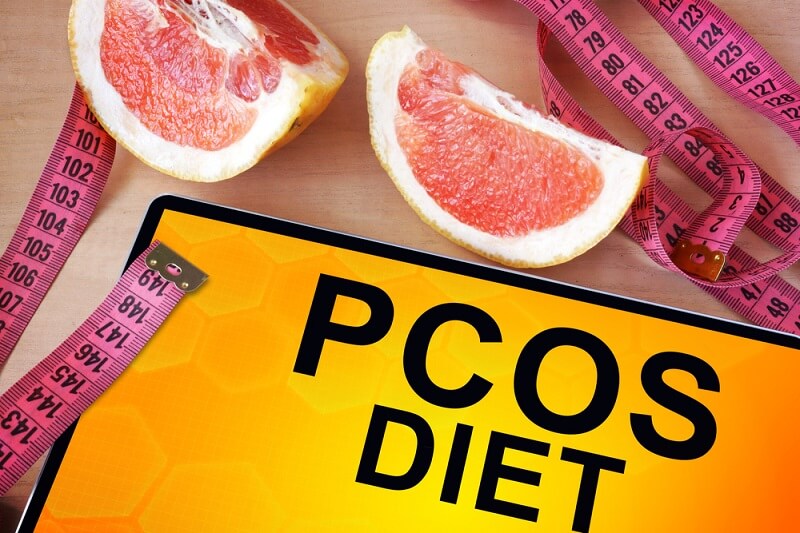How can nutrition improve PCOS symptoms?
PCOS or Polycystic Ovarian Syndrome affects many women and impacts their daily life. This syndrome is very common and if you have it you may be interested in different ways you can improve your symptoms. Changing your diet could improve some of the symptoms associated with PCOS.
What is PCOS and how does it affect fertility?
PCOS is an infertility disorder. This disorder affects about 8 to 13% of reproductive-aged women. This disorder is also an endocrine disorder. Some of the symptoms are infertility, acne, lack of menstruation, irregular menstruation, and insulin resistance. This disorder can be difficult to diagnose due to the varying symptoms. PCOS is believed to be the reason for about 40% of female infertility. PCOS often accompanies other disorders such as glucose intolerance, type 2 diabetes, and hypertension.
PCOS is often first diagnosed when women are teenagers. PCOS is a lifelong disorder and symptoms can change throughout a woman’s life. Often women with PCOS struggle with their weight. PCOS can also be associated with low self-esteem, depression, and low quality of life. Many women do live happy and fulfilling lives with PCOS, but the symptoms can be difficult to manage.[1]

What diet changes can improve the symptoms of PCOS?
Diet changes have helped women who are struggling with the symptoms of PCOS. A low-calorie diet has been proven to help women in managing some of the symptoms of PCOS. Specifically, the ketogenic diet or keto has shown improvements in women’s symptoms. This diet is low in carbohydrates. The carbs are replaced with plant-based fat. This diet has been proven to improve menstruation regularity, reduce blood glucose, and body weight, and improve liver function in many women struggling with PCOS. The keto diet has shown the most improvement for PCOS patients who struggle with obesity.
This syndrome is very difficult for many women. Some women with PCOS maintain a very healthy lifestyle and still gain weight. You should not try any extreme diet or changes to your nutrition before consulting your doctor. Diets can be a very sensitive subject and if your doctor does recommend a diet remember you are treating the symptoms of PCOS rather than changing yourself. [2]
How can lifestyle changes help women with PCOS?
Changing your lifestyle may be a key part of managing your PCOS. This does not mean your lifestyle is wrong in any way, but PCOS is a unique disorder that may require some unique steps to manage it. If you have PCOS your doctor may recommend some lifestyle changes such as regular exercise and regulating your appetite. Fatigue is also a common symptom of PCOS. You may be recommended to see a sleep specialist to discover how to improve your sleeping. Weight-neutral eating programs have been found to help women with PCOS. These programs focus on positively changing your eating habits rather than focusing on weight. Being educated about your health is also very important with PCOS. Being your own advocate can be important when managing your symptoms. There are many different recommendations to treat PCOS symptoms, but your health and happiness are the most important. PCOS can be very difficult, but it is very possible to find the right diet and lifestyle for you that will improve your symptoms. [3]
Sources:
[1] Khan MJ, Ullah A, Basit S. Genetic Basis of Polycystic Ovary Syndrome (PCOS): Current Perspectives. Appl Clin Genet. 2019 Dec 24;12:249-260. doi: 10.2147/TACG.S200341. PMID: 31920361; PMCID: PMC6935309.
[2] Szczuko M, Kikut J, Szczuko U, Szydłowska I, Nawrocka-Rutkowska J, Ziętek M, Verbanac D, Saso L. Nutrition Strategy and Life Style in Polycystic Ovary Syndrome-Narrative Review. Nutrients. 2021 Jul 18;13(7):2452. doi: 10.3390/nu13072452. PMID: 34371961; PMCID: PMC8308732.
[3] Ee C, Pirotta S, Mousa A, Moran L, Lim S. Providing lifestyle advice to women with PCOS: an overview of practical issues affecting success. BMC Endocr Disord. 2021 Nov 23;21(1):234. doi: 10.1186/s12902-021-00890-8. PMID: 34814919; PMCID: PMC8609880.






